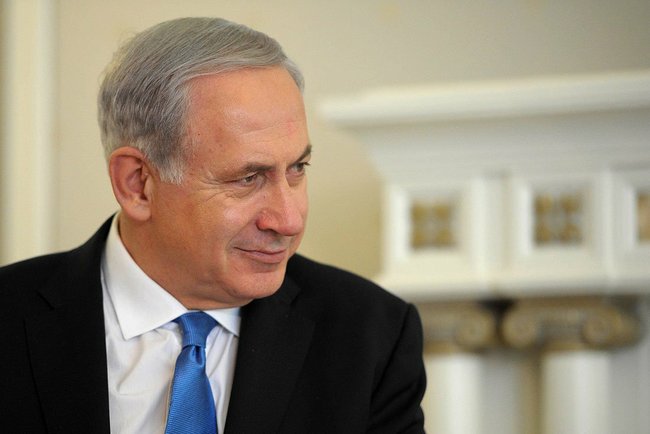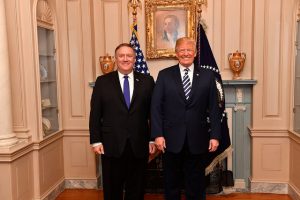by Paul R. Pillar
Benjamin Netanyahu will talk next week, as he has innumerable times before, about how an Iranian nuclear weapon is supposedly an extremely grave and imminent (he has been saying for years that it is just around the corner) threat to world peace and to his nation. There has been genuine concern in Israel about this subject, but Netanyahu’s own behavior and posture indicate this is not the concern that is driving his conduct and in particular his diplomacy-wrecking efforts. He is acting out of other motives, ones that—quite unlike the objective of avoiding an Iranian nuclear weapon—are not shared with the United States and instead directly conflict with U.S. interests.
There have been plenty of reasons to doubt all along Netanyahu’s alarmist rhetoric. There has been his history of wolf-crying on the subject, against the background of an Iran that has not even decided to build a nuclear weapon. There is the further background of Israel’s overwhelming military superiority in the region, at not only the conventional level but also at the level about which Netanyahu is raising such alarm. And there are the repeated indications that his alarmism goes beyond what even his own security services believe.
But even those reasons are not the main ones to conclude that Netanyahu is not acting on behalf of precluding an Iranian nuclear weapon. The main, and most obvious, reason is that he is pushing for an outcome that would removerestrictions and enhanced monitoring of the Iranian nuclear program and would give the Iranians more freedom to expand that program than they otherwise would have. That would be the result of destroying the negotiation process that Netanyahu is trying to destroy, while destroying along with it the preliminary agreement that has kept the Iranian program more heavily restricted and monitored than it had ever been before. An absence of agreement is the only plausible alternative to whatever agreement emerges from the current negotiations, and Netanyahu is smart enough to realize that.
The made-for-TV (and for Israeli campaign ads) platform in the House of Representatives chamber does not give members of Congress an opportunity to ask questions of Netanyahu. All that members can do is to bob up and down out of their seats in a gluteus-abusing way of supposedly expressing their “support for Israel.” But if they could ask questions, the glaring question begging to be asked is, “Mr. Prime Minister, if you really are so concerned about the possibility of the Iranian nuclear program leading to a nuclear weapon, why are you urging us to take actions that would result in that program having fewer restrictions, and less international monitoring, than it otherwise would?”
The prime objective that Netanyahu is pursuing, and that is quite consistent with his lobbying and other behavior, is not the prevention of an Iranian nuclear weapon but instead the prevention of any agreement with Iran. It is not the specific terms of an agreement that are most important to him, but instead whether there is to be any agreement at all. Netanyahu’s defense minister recently made the nature of the objective explicit when he denounced in advance “every deal” that could be made between the West and Tehran. As accompaniments to an absence of any agreements between the West and Iran, the Israeli government’s objective includes permanent pariah status for Iran and in particular an absence of any business being done, on any subject, between Washington and Tehran.
From Netanyahu’s viewpoint this objective serves several purposes. It diminishes the freedom of action of a major competitor (the second most populous country in the Middle East) for regional influence, and one that will continue to be highly critical of Israel as long as the Palestinian issue endures. By postulating a permanent, ominous threat emanating from Iran, one of the assumptions underlying a U.S. strategic relationship with Israel is retained. By opposing—and to the extent Israeli efforts are successful, preventing—the United States from doing any worthwhile business with Iran, whether on nuclear matters or on anything else, the Israeli claim to being the only reliable and effective U.S. partner in the region sounds more convincing.
The specter of Iran and especially of its nuclear program also serves as the best possible distraction and diversion from issues in which Israel is the chief problem and that Netanyahu and his government would rather not talk about. This especially includes, of course, the continued Israeli occupation of, and policies in, Palestinian territory. Netanyahu repeatedly and quickly responds to efforts by others to engage on these other issues, and especially to any direct criticism of Israeli policies, by reminding us that Iran is the “real” threat to peace and security in the region. Permanent festering of the Iranian nuclear issue serves Netanyahu’s objectives better than any resolution of the issue would.
The United States does not share an interest in any of these objectives, and some of them are clearly contrary to U.S. interests. The United States does not have an interest in blanket favoring of any one competitor for regional influence over others; it instead has interests in many individual issues, on some of which its interests might align with those of particular regional players and on others of which it may share interests with other players. It is contrary to U.S. interests to give the right-wing Israeli government any means to perpetuate the occupation and the unresolved conflict with the Palestinians, given the multiple ways, including having the United States share blame for the occupation in the eyes of most Middle Easterners, that the occupation redounds to the disadvantage of the United States.
Probably the most direct conflict with U.S. interests comes from Netanyahu in effect telling the United States that it cannot do business with certain other countries, and that it cannot fully use its diplomatic tools to pursue U.S. interests as it sees fit. It is in the U.S. interest to use diplomacy with Iran, most obviously and immediately to restrict the Iranian nuclear program but also potentially on many other issues of importance to the United States. Netanyahu is trying to keep one of the United States’ hands tied behind its back. He is trying to restrict the freedom of action not just of Iran but of the United States. That is bad for U.S. interests no matter what party is in power in Washington, no matter who is the U.S. president, no matter what other countries U.S. diplomacy may touch, and no matter what specific policies the U.S. administration of the day may want to achieve and ought to have both hands free to try to achieve.
Amid all the understandable controversy about the highly inappropriate way in which Netanyahu’s Congressional appearance has come about, there have been appeals to focus on the substance at hand. Good advice—as long as we recognize the actual substance and the actual game being played. We should not be diverted by the scaremongering rhetoric from the man at the podium, who is acting so inconsistently with the implications of his own rhetoric, any more than we should dwell forever on the underhanded political games that got him there. In between the bounces on their seats, members of Congress should think hard about whether it is Likud’s interests or U.S. interests that they have at heart, and how efforts associated with the former are undermining the latter.
This article was first published by the National Interest and was reprinted here with permission. Copyright The National Interest.






In 2003, Iran only had a few dozen centrifuges when it first attempted to engage the US in talks. By 2005 Iran had a few hundred centrifuges and was in talks with the European Union. Did we talk to Iran? No! We spurned talking to Iran, because, as Dick Cheney said “We don’t negotiate with evil. We defeat it.” So, while we were ignoring “evil” and giving “evil” the cold shoulder, and possibly mulling over our strategies for vanquishing “evil,” Iran was busy creating and installing as many centrifuges as it could. Iran went from zero centrifuges installed at the beginning of the Bush administration, to 6000 centrifuges by the end of the Bush administration.
We should put the past behind us and build a new relationship with Iran. There is no upside in not pursuing better, friendlier relations. Not for this country anyway.
Evidence indicates that the US and Israel must keep Iran as an enemy until Israel is able to occupy all of Palestine with “ethnic cleansing.”. Israel, under UN Res 242, has the position that its “defensible borders” are Palestine’s borders, and little bits of Syria and Lebanon wouldn’t hurt.
Nuclear is only a part if the US strategy. The US has also sanctioned Iran for human rights abuses; development of unconventional weapons and ballistic missiles; support for international terrorism; deceptive banking; computer and network disruption, monitoring, and tracking; faulty elections and evading sanctions.
Yes. It is all smoke and mirrors, misdirection (in magic, is a form of deception in which the attention of an audience is focused on one thing in order to distract its attention from another).
Bibi the master magician.
Thank you Paul Pillar. Keeping all other objectives under the nuclear umbrella issue is easy for the general public to comprehend and understand! Fear mongering can not be achieved by putting all other objectives on the table for the public to see.
The Arab nations power has been diminishing within the last 20 years or so and Israel feels no pressure politically or militarily from the Arab nations to resolve its differences with Palestinians. Also the chaotic situations in the Arab world is helping Israel economically simply by selling arms to the Arab nations and further destabilizing the Arab nations by supporting various terrorist groups in the ME. So the only non-Arab nation in the ME with a large population, Iran, is being seen in Israel as a competitor and a balancing power that has to be weakened and/ or destabilized in order for Israel to retain its hegemony in the region. Israel final objectives are not only to take the Palestinian land but also to expand its territory into Syria, Jordan and Lebenan in order to make room for other immigrants from around the world as Nathanyaho has said it in EU. It is interesting that the Iranian foreign policy for the ME is just the opposit of the Israel’s final expansion objectives! Unfortunately for the time being the Palestinians are caught in the middle!!!
“I believe this effort is fruitless and it should not be an impediment to an agreement,” Iranian Foreign Minister Mohammad Javad Zarif said at a joint press conference (on Saturday) with his visiting Italian counterpart Paolo Gentiloni.
“It is unfortunate that there is a group which sees its interests in tension and crisis.”
Netanyahu’s bid was “an attempt to utilise a fabricated crisis to cover up realities in the region, including occupation, the suppression of Palestinians and the violation of their rights”, he said.
“It is an on old policy to intimidate and spread lies … in order to prevent peace in the region,” said Zarif.